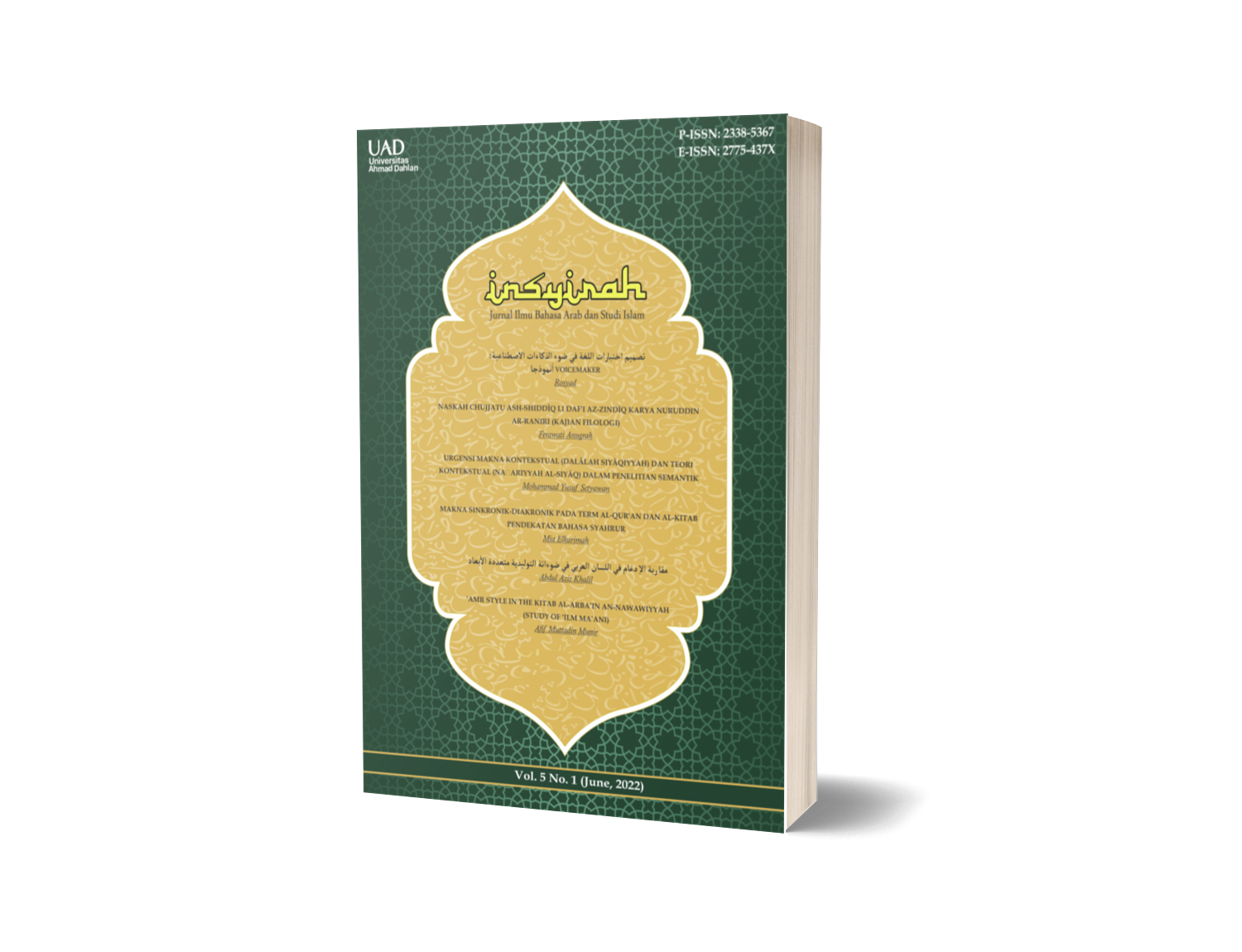Kajian Tindak Tutur Ilokusi dalam Serial Drama Turki “Sultan Abdul Hamid II Episode 1”
The Study of Illocutionary Acts in Turkish Drama Series “Sultan Abdul Hamid II Episode 1”
DOI:
https://doi.org/10.26555/insyirah.v5i2.6889Keywords:
Illocutionary Acts, Turkish Drama, Sultan Abdul Hamid IIAbstract
The prestige of Turkish drama series in the world cinema is considered worthy of appreciation. Every drama that is presented can grab the attention of the audience. It is because of some elements such as theme, genre, storyline, and setting. One of the Turkish dramas that have caught the public attention is the drama series of Sultan Abdul Hamid II. This study aims to describe illocutionary speech as well as the meaning of the utterances contained in this drama series. This is qualitative descriptive research. The data collection technique used was the speaking-free listening technique. Meanwhile, the data analysis techniques used were (1) recording the utterances contained in the series Sultan Abdul Hamid II episode 1, (2) collecting and classifying utterances, and (3) describing the intent of the utterances. Based on the results of data analysis, there are four types of illocutionary, including directive, declarative, representative, and expressive. In directive utterances, utterances are related to the actions of ordering, begging, requesting, forbidding, and suggesting. Then, in the utterance of the declaration, there are elements of affirmation that contain the intention of glorifying, deciding, maintaining secrecy, and satirizing. Meanwhile, representative utterances are related to utterances that intend to state, to reveal, to report, and to describe. Then in expressive speech, various expressions express the intention of praising, praying, expressing thanks, admiration, satirizing, and conveying joy.
References
Artati, A., Wardhana, D. E. C., & Basuki, R. (2020). Tindak Tutur Ilokusi Asertif, Direktif, Ekspresif, Komisif, dan Deklaratif pada Program Gelar Wicara Mata Najwa. Diksa : Pendidikan Bahasa dan Sastra Indonesia, 6(1), 43–57. https://doi.org/10.33369/diksa.v6i1.9687
Faramida, I. (2019). Tindak Tutur Representatif pada Caption Instagram. Jurnal Tuah, 1(1), 8-17.
Fauzi, A. I., Al-Muhammady, F. H., & Maki, A. (2020). Fenomena Implikatur Percakapan Dalam Film Animasi Salahuddin Al Ayyubi Perspektif Grice (Kajian Pragmatik). 392–403.
J Moleong, L. (2014). Metodologi Penelitian Kualitatif. PT Remaja Rosda Karya Bandung.
Kua’, K. D. (n.d.). Prinsip Kerja Sama Dan Tindak Tutur Pada Film. 7.
Kusumawati, E., & Azimah, N. (2020). Analisis Tindak Tutur Ilokusi pada Percakapan Nabi Musa AS. dalam Surat Thaha | Kusumawati | Shaut al Arabiyyah. http://journal.uin-alauddin.ac.id/index.php/Shautul-Arabiyah/article/view/17559
Melani, M. V., & Utomo, A. P. Y. (2022). Analisis Tindak Tutur Ilokusi Akun Baksosapi.gapakemicin dalam Unggahan di Instagram (Suatu Analisis Pragmatik). 3, 2, 250–259.
Nesi, A., & Sarwoyo, V. (2012). ANALISIS WACANA Logis Berwacana dan Santun Bertutur. Penerbit NUSA INDAH (Anggota IKAPI).
Rahmawati, R. K. (2017). Studi Historis Kebijakan Luar Negeri Sultan Abdul Hamid II di Daulah ‘Utsmaniyah (1876-1909 M). 1(1), 193–211.
Rini, R., & Yasmar, R. (2020). Peningkatan Kompetensi Istima’ wa Takallum Melalui Media Film. 4(1), 155–178.
Sagita, V. R., & Setiawan, T. (2019). Tindak Tutur Ilokusi Ridwan Kamil dalam Talkshow Insight di CNN Indonesia. 9(2).
Sagita, V. R., & Setiawan, T. (2020). Tindak Tutur Ilokusi Ridwan Kamil dalam “Talkshow Insight” di CNN Indonesia (The Form and Type of Illocutionary Speech Acts Ridwan Kamil in the “Insight Talkshow” at CNN Indonesia). Lensa: Kajian Kebahasaan, Kesusastraan, dan Budaya, 9(2), 187. https://doi.org/10.26714/lensa.9.2.2019.187-200
Taha, M. (2022). Tindak Tutur Ilokusi Deklaratif, Asertif, Komisif, dan Direktif dalam Berita Acara Pemeriksaan (BAP) Polda Maluku Utara. Madah: Jurnal Bahasa dan Sastra, 13(1). https://doi.org/10.31503/madah.v13i1.437
Zaim, M. (2014). Metode Penelitian Bahasa: Pendidikan Struktural. FBS UNP Press Padang.
Downloads
Published
Issue
Section
License
Copyright (c) 2022 Nahdliyyatul Azimah, Rahman Hakim, Khoirin Nikmah

This work is licensed under a Creative Commons Attribution-ShareAlike 4.0 International License.









